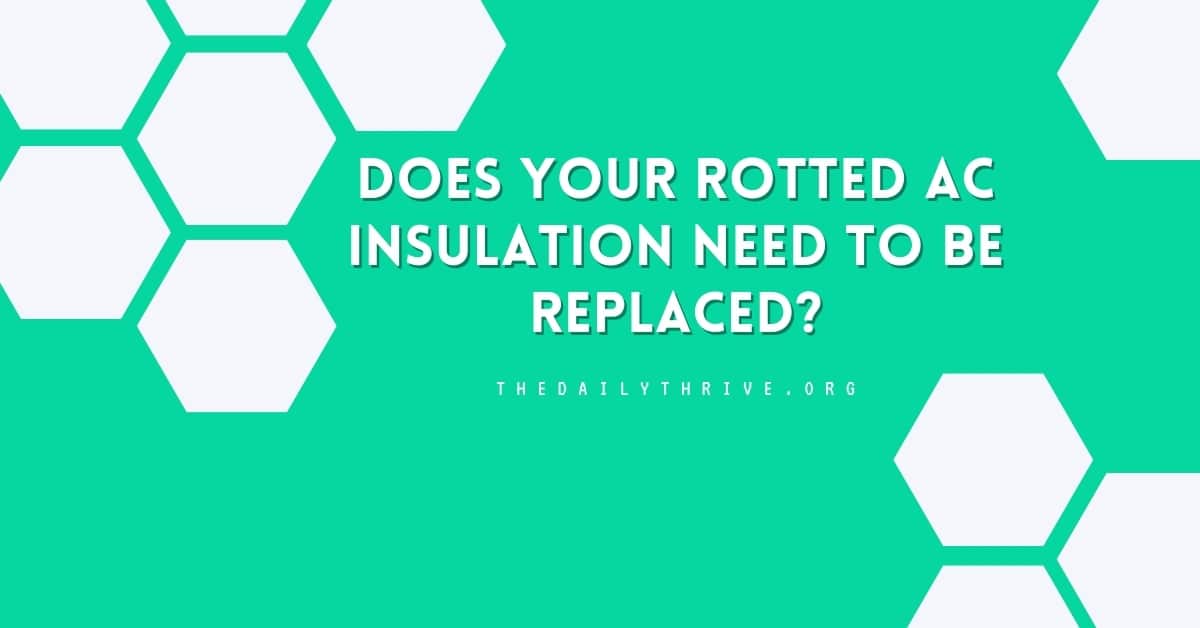How do you know if your insulation is rotting? And if it is, what do you do to fix it? Here we provide answers to all of these questions and more about AC insulation rot.
Central air conditioning systems always come with an outdoor component. Because of its location, this unit is susceptible to a lot of wear and tear. Over time all of the elemental exposure will start to deteriorate parts of the air conditioning unit. As condensation builds up and your AC insulation starts to rot, other problems with your air conditioner are sure to arise. Including a continually increasing electric bill.
What Does AC Insulation Do?
The insulation used on your air conditioner is there to help with a number of different things.
- To help prevent piping from losing heat and gaining heat
- Insulated air conditioning systems are better prepared to fight off the effects of water vapor and condensation.
- Quality insulation protects against salt, dust, chemicals, UV light, and oil.
- Certain insulation comes with the ability to fight off bacteria, fungi, and virus growth.
- Insulation provides a sound barrier against the vibrations taking place within the piping.
Quality AC insulation is always:
- Fairly strong
- Non-combustible
- Resistant to UV rays
- Has low thermal conductivity
Insulation materials to cover pipes can be made from a number of materials, including foam, wool, glass, rubber, cork, or Polyurethane (P.U.).
Signs of Rotting AC Insulation
Unless you regularly inspect your outdoor air conditioner unit, you might not notice if your insulation has begun to rot. It is not uncommon for someone to call a professional HVAC technician out due to other concerns and then learn that AC insulation is rotting and needs to be replaced.
Some clues that your AC insulation might need to be replaced:
- Visibly appears to be rotting
- Coming apart, flaky to the touch
- You notice your electric bill is steadily increasing
- AC is not working as efficiently as it once did
- It’s been years since you have had your AC unit inspected
How To Fix Rotting AC Insulation
By simply looking at the insulation on the outside of your air conditioning unit, you should be able to tell if it is rotting or not. The less often you keep up with maintenance on your AC, the more likely the insulation has started to rot.
In order to fix the problem, old insulation must be completely removed and replaced. After taking off the old AC insulation foam, you will need to measure the diameter of the two thickest tubes coming from the backside of the unit. The smallest tube does not need insulation.
The foam necessary to replace the insulation is only available through refrigeration supply companies and some online retailers. According to specific instructions from the manufacturer of your AC unit, you will want to use a different type of foam to get the job done right.
If you are able to get the appropriate foam, you will cut the insulation a few inches longer than the AC line. You will then wrap the foam around the line. When ready, you will remove the adhesive liner and press the two sides of the foam together. Once you press firmly, you will not be able to dis-attach, so be careful during this process.
Preventing Future AC Insulation Rot
When left unprotected, it is almost impossible to completely prevent water from building up and creating damage. Even if you take great care of your HVAC system, over time, your insulation will wear out and require to be replaced. If you let insulation go untreated, your AC will not work as efficiently and will actually cost you more money on your electric bills.
The number one way to prevent air conditioner insulation rot from getting out of hand is to have your unit regularly inspected by you and/or a professional. The next best way is to keep your unit protected from the outdoor elements by building a non-enclosed shelter around it.
Since air conditioners naturally produce moisture, your system can be the source of its own condensation issues. But by protecting your unit from the elements as best as you can, there will be less risk of your insulation rotting.
Another good way to prevent AC insulation rot is to place your outdoor unit on a raised platform of some sort. When sat directly onto the ground, your air conditioning unit is bound to attract water and other messy elements. Imagine all it takes is one rain, and your insulation is soaked in water. Over time, excessive moisture will always produce a rotting effect. The more ways you can reduce your unit’s exposure to water, the longer your insulation will last without rotting.






